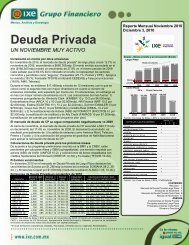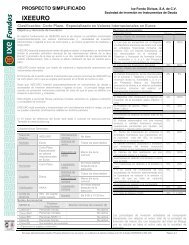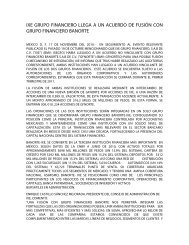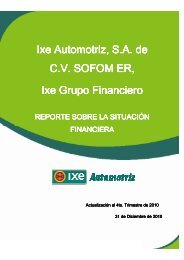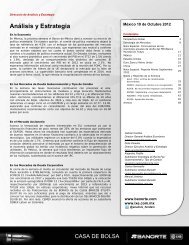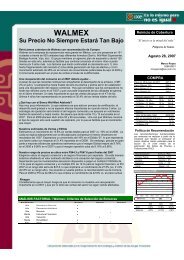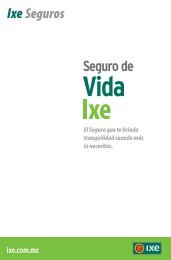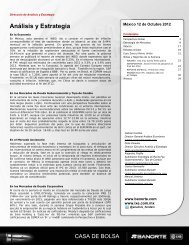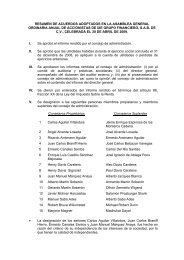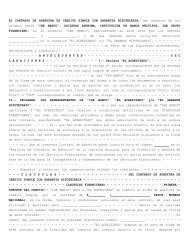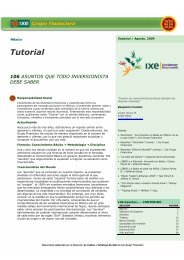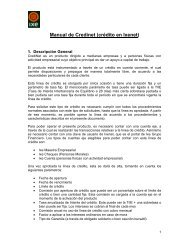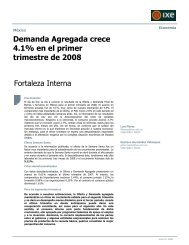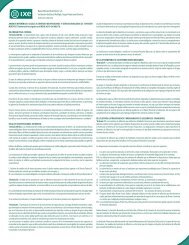2012 Annual Report - Ixe
2012 Annual Report - Ixe
2012 Annual Report - Ixe
You also want an ePaper? Increase the reach of your titles
YUMPU automatically turns print PDFs into web optimized ePapers that Google loves.
Informe Anual 2010<br />
<strong>Annual</strong> <strong>Report</strong> <strong>2012</strong><br />
Cellular token<br />
In <strong>2012</strong> we began migrating the physical token to a mobile<br />
device token. In the space of just 8 months, 10% of Electronic<br />
Banking customers began using this service and 1 out of every<br />
4 customers that use our products and services prefer to do so<br />
with a cellular token.<br />
The elimination of the physical token generates substantial<br />
savings for the institution while also contributing to environmental<br />
conservation, since as it is no longer needed, neither does it<br />
have to be made or thrown away. This project is therefore one<br />
of our priorities in 2013.<br />
Token recycling at branches<br />
This initiative consisted of collecting tokens that customers<br />
returned either because they stopped working, had expired<br />
or because of a migration to a cellular token. These tokens<br />
were analyzed to check whether they could be reused by new<br />
customers in order to fully exploit their useful life. It is important<br />
to mention that to date, none have been discarded, since this<br />
type of waste disposal requires special handling.<br />
Pilot project for competitiveness – MiPyME (Micro-SMEs)<br />
Banorte participates jointly with the Global Institute of<br />
Sustainability at the Monterrey Institute for Technology and<br />
Higher Education (ITESM), the Multilateral Investment Fund (MIF)<br />
of the Inter-American Development Bank, FEMSA, and Walmart<br />
in the “Pilot project for Micro-SME competitiveness through the<br />
Implementation of Sustainable Practices”. The overall aim of<br />
this pilot project for Micro-SMEs is to boost their competitiveness<br />
within the supply chains of the largest companies (known as<br />
anchor or tractor companies) through the implementation of<br />
sustainable practices. Within the frame of this project, Banorte<br />
seeks to create financial instruments that help Micro-SMEs gain<br />
access to clean and efficient technology.<br />
INTERNAL INITIATIVES<br />
Social and Environmental Management System (SEMS)<br />
This process is incorporated in the Bank’s credit analysis system<br />
which enables us to include environmental data at the Group<br />
level as well as improve management of our resources in order<br />
to subsequently report them.<br />
During the first phase of its implementation more than 300 of<br />
the Group’s key people will receive training to ensure that the<br />
projects financed by our institution comply with the IFC’s set of<br />
socio-environmental standards (IFC Performance Standards)<br />
through a process that identifies and assigns a level of socioenvironmental<br />
risk to the projects.<br />
During the year internal roles and responsibilities were also<br />
assigned:<br />
• Environment Officer: supervises the working of SEMS and<br />
supports the Environmental Coordinator.<br />
• Environmental Coordinator: advises account executives on<br />
filtering projects and determining the socio-environmental<br />
risks associated with each as well as providing ongoing<br />
training for all those involved in the process.<br />
Pago Móvil<br />
In <strong>2012</strong>, Grupo Financiero Banorte developed Pago Móvil<br />
(mobile payment), a platform that enables customers to make<br />
payments at retail establishments without using a physical card.<br />
Today our customers are already making payments with their<br />
cellular phones instead of using plastic cards meaning that in<br />
the future we can have accounts that do not issue cards at<br />
all, thus reducing our environmental impact.<br />
As an External Advisor, UMA supports the Environmental<br />
Coordinator with the SEMS implementation process and offers<br />
its expertise and knowledge to projects when required.<br />
Likewise, in order to further strengthen the initiative, 11 Champions<br />
received training in environmental and social risk. There is one<br />
per territory whose main duty is to offer socio-environmental<br />
opinions to all involved and resolve doubts about SEMS.<br />
53



